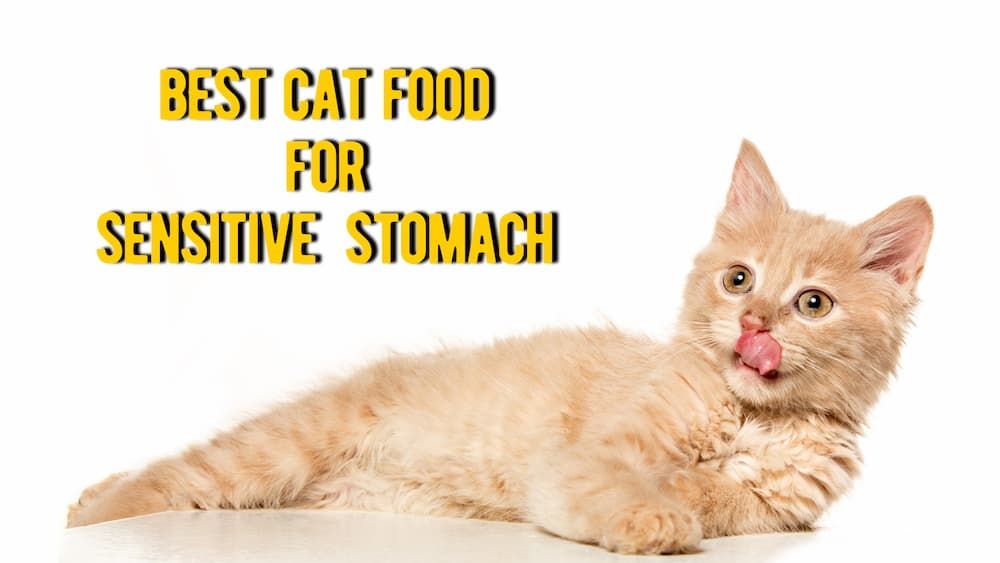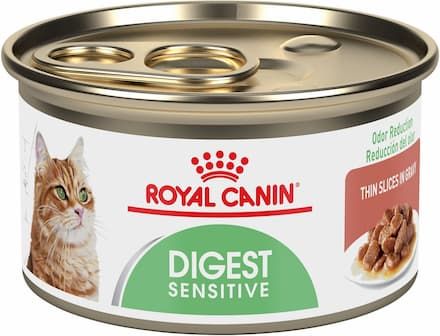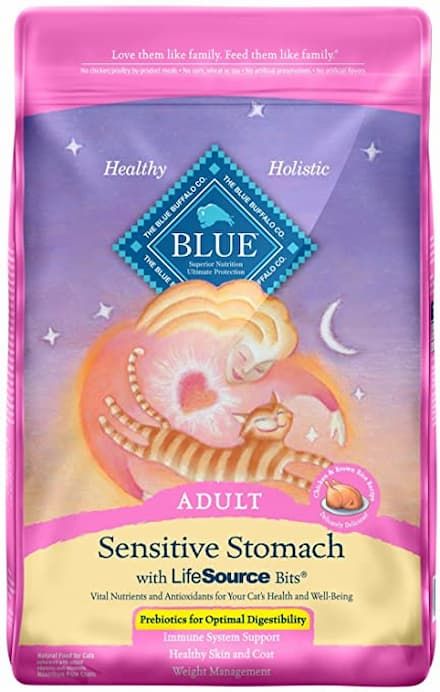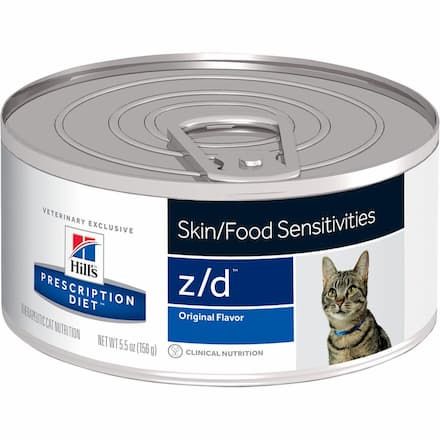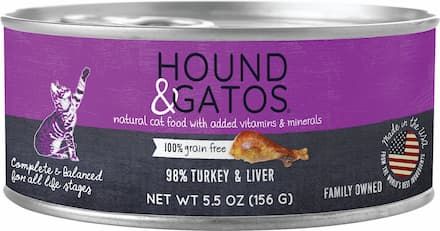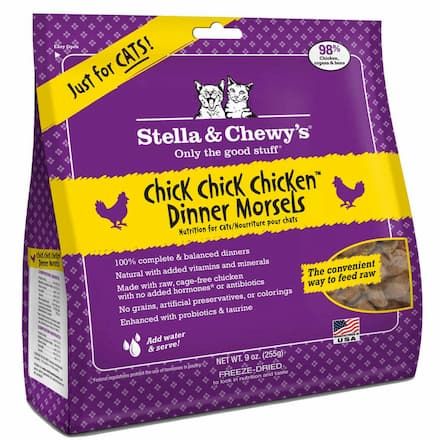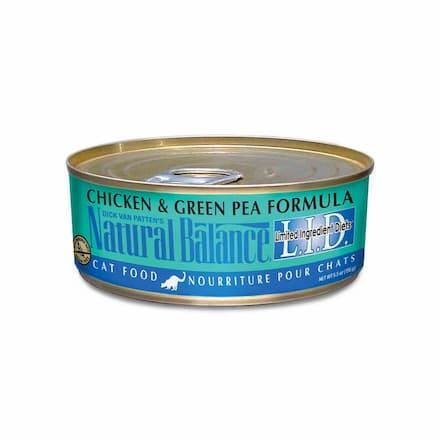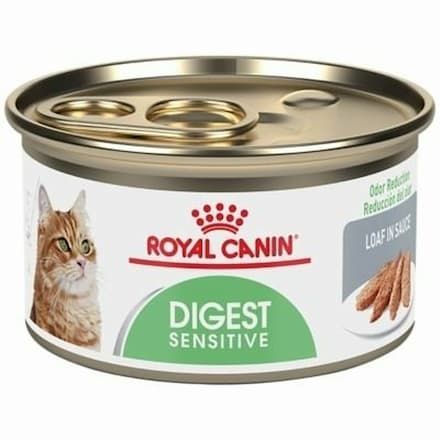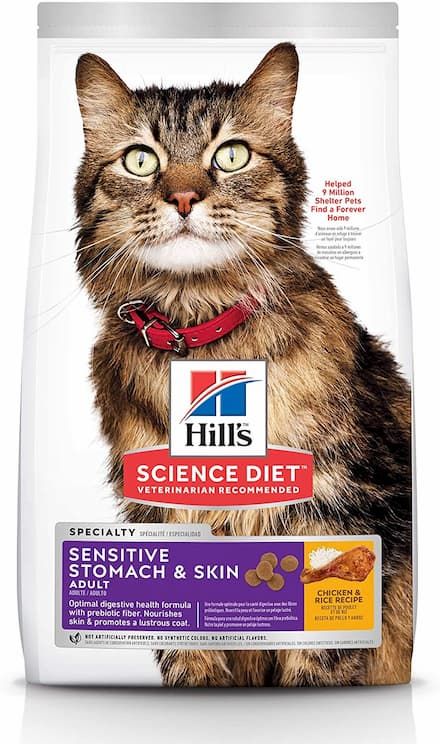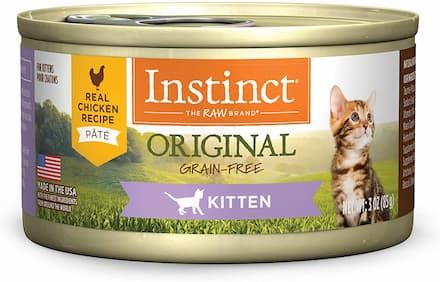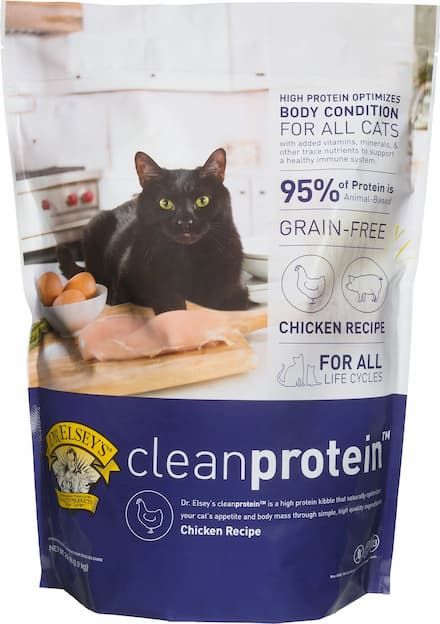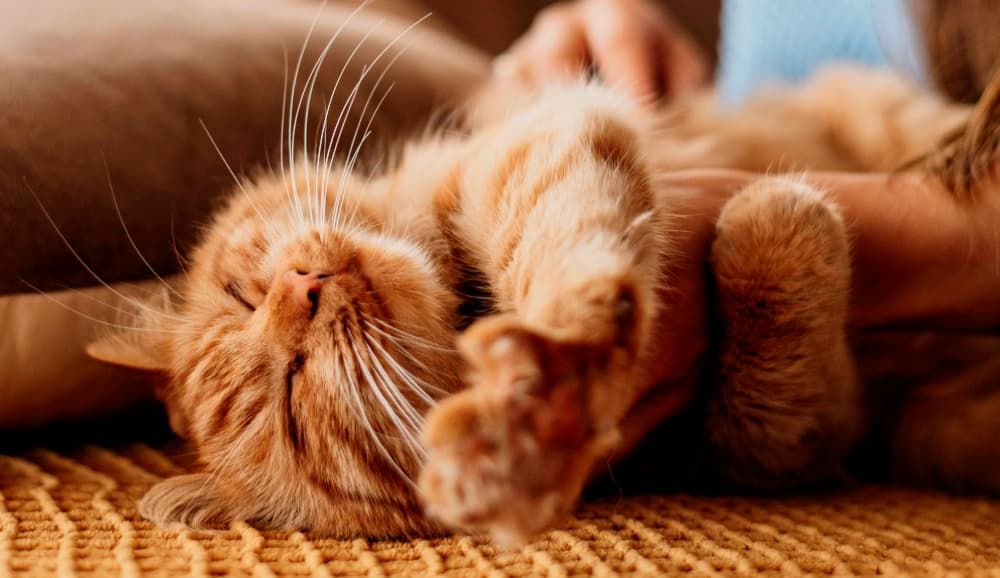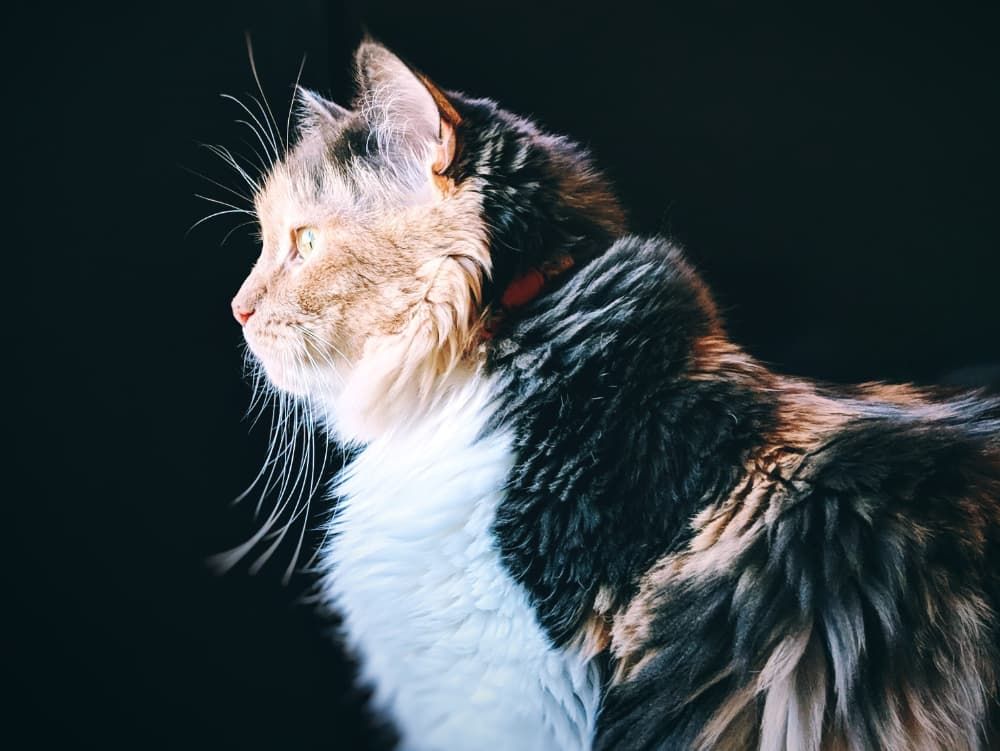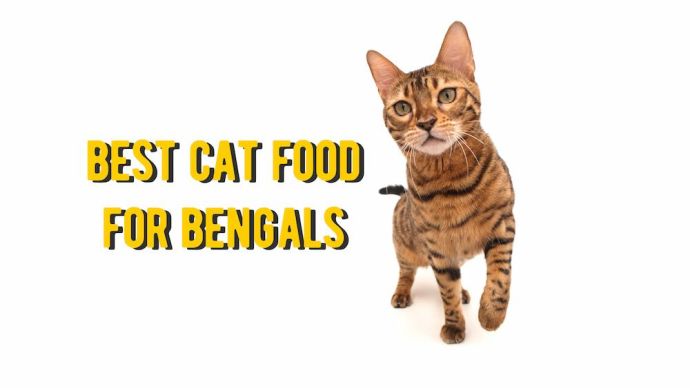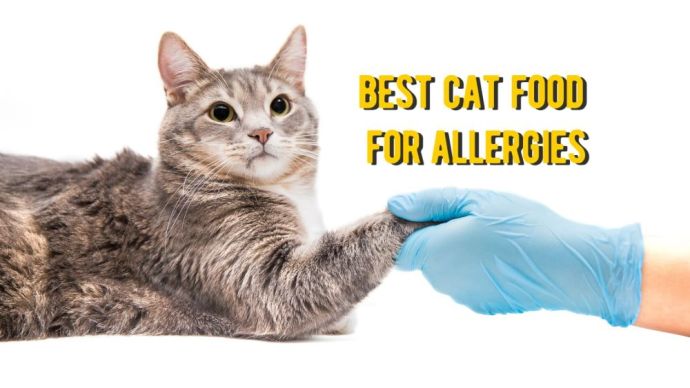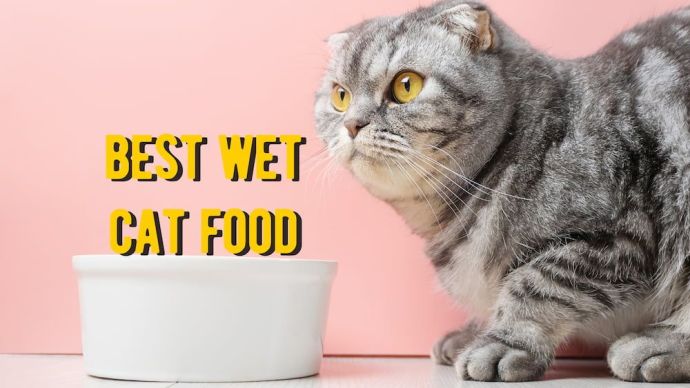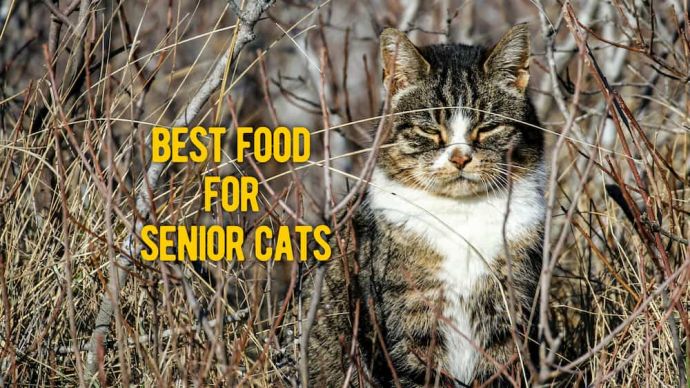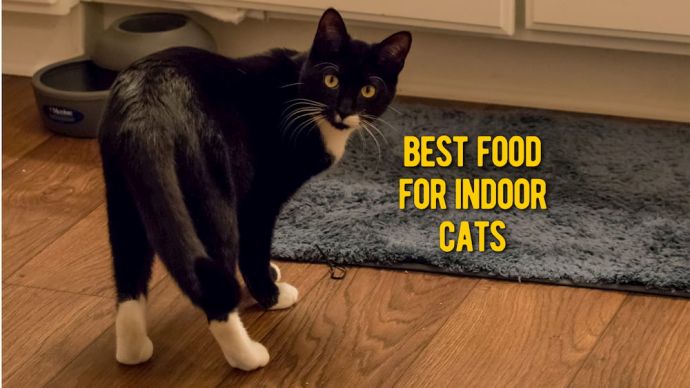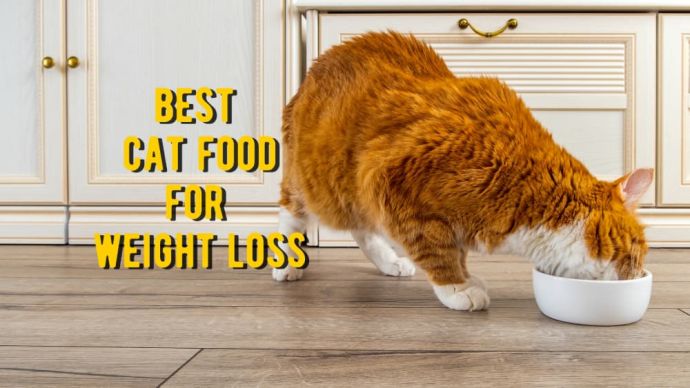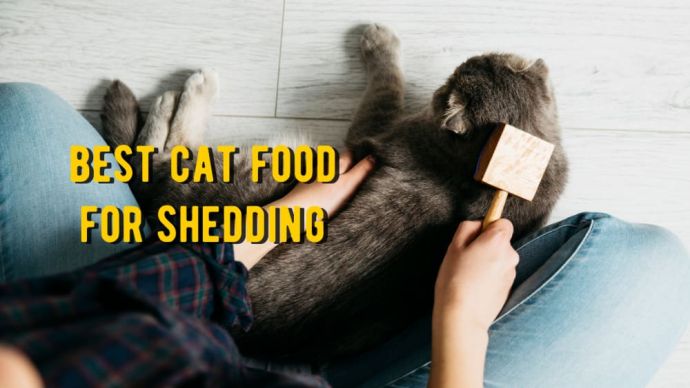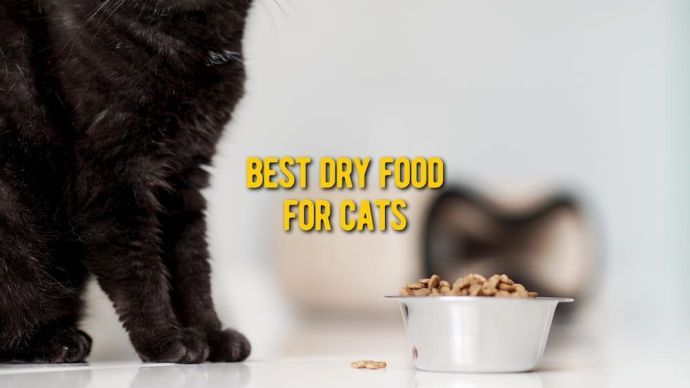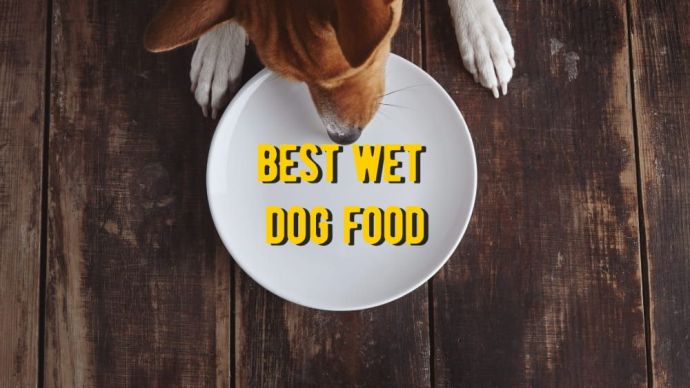The Best Cat Food for Sensitive Stomachs (Vet Approved Review)
Written by:
Author: Vicki Smirnova
Vicki Smirnova is a professional writer and editor who adores animals and helps readers get along well with their pets. She has been working in digital media for more than 5 years and has great experience writing content about lifestyle, including pets. Vicki specializes in dog health and nutrition, cat feeding, dog training. She is an aquarium lover and is passionate to write about fish care at home. Also, Vicki headed several websites and worked as a news editor.
View all 245 articlesLearn about our editorial process and veterinary review board.
Reviewed by:
Veterinary review
by Dr. Linda Simon
Dr. Linda Simon is a veterinary surgeon working with seven years of experience. She is a fellow of the British Veterinary Association and specializing in animal medicine. Also, she has been the Woman magazine resident vet for the past two years and writes a regular column for them, focusing on pets and their health.
View all 30 articlesLearn about our veterinary review board
Viewed: 2519
Updated on: 01/24/2023
Cats, like humans, are prone to digestive problems. Therefore, choosing a pet food that will not cause problems is essential. A gastrointestinal disorder is any condition that interferes with proper digestion or changes the rate at which food passes through the gastrointestinal tract. Gastrointestinal trouble is one of the most common reasons for contacting a veterinarian. Constipation, diarrhea, vomiting, excessive gas, loss of appetite, hairballs, or even general lethargy are all symptoms of a cat with a digestive problem.
Our TOP-3 Rated Picks
Products | Benefits | Links |
Our TOP Pick | 1. Royal Canin Digest Sensitive Thin Slices in Gravy Canned Cat Food It is the best cat food for cats with digestive problems designed to meet the needs of cats and their instinctive preferences. It provides 100% complete and balanced nutrition. | |
#1 Dry Pick | 2. Blue Buffalo Sensitive Stomach Formula Dry Cat Food The food delivers a powerful protein punch and contains grains and prebiotics that soothe the stomach. | |
#1 Canned Pick | 3. Hill's Prescription Diet z/d Skin/Food Sensitivities Canned Cat Food It is formulated with highly digestible carbohydrates and fats and helps reduce the possibility of adverse reactions to food. |
*All ratings are formed by the article’s author based on own research and combined with customer reviews.
The Best Cat Food for Digestive Problems Reviews
We have compiled a list of great options on the market.
1. Royal Canin Digest Sensitive Thin Slices in Gravy Canned Cat Food
Royal Canin Feline Health Nutrition formula is the most suitable food for cats with digestive problems. The food also helps reduce the smell of cat feces. This means that your cat gets to enjoy food that suits their palate, and at the same time, receives the balanced nutrition that they need at each feeding. [1]
Key features:
- Designed around a cat’s nutritional needs and instinctive preferences.
- Thin slices in gravy are highly palatable while providing a moderate number of calories.
- Supports ideal weight maintenance.
Pros
Cons
- Ideal balance between proteins, fats, and carbohydrates.
- Made to help reduce stool odor.
- The chunks might be too large for kittens.
2. Blue Buffalo Sensitive Stomach Formula Dry Cat Food
This product for adult, senior cats with sensitive stomachs and is made from real chicken as the first ingredient. The feed contains no gluten, wheat, or by-products. It also contains omega fatty acids for healthy skin and a glossy coat, taurine for vision and heart health, and other essential amino acids. It is specially designed to support the digestive system’s health and for the formation of a firmer stool.
Key features:
- Contains specially formulated ‘Life Source Bits’.
- Formula influenced by holistic veterinarians.
- Contains probiotics.
Pros
Cons
- No chicken by-products.
- Free of artificial preservatives.
- US-based company.
- Contains grains, so not suitable for grain-sensitive cats.
- Also has fish and eggs, which may irritate some kitty tummies.
3. Hill’s Prescription Diet z/d Skin/Food Sensitivities Canned Cat Food
Hill’s Prescription Diet Z/D is specially designed for susceptible cats to certain foods. Pets that are allergic (or sensitive) to certain food groups/ingredients may have chronic G.I. signs, trouble putting on weight and coat, and skin problems.
If your cat suffers from skin and/or tummy trouble, it may well be due to their diet. This canned food Hill’s Prescription Diet (recipe Z/D) provides your pet with a balanced diet that will provide the animal with all the necessary vitamins and minerals.
Key features:
- Clinical nutrition is specially formulated to help manage dietary sensitivity.
- Formulated with highly digestible carbohydrates and fats.
- Help reduce the possibility of adverse reactions to food.
Pros
Cons
- Help reduce gastrointestinal workload.
- Developed with increased omega 3 and 6 fatty acids.
- One of the most expensive foods on the market.
4. Hound & Gatos 98% Turkey & Liver Formula Grain-Free Canned Cat Food
Hound & Gatos 98% Turkey & Liver Formula is made in the USA and contains no grains. This delicious wet food is made from the highest quality ingredients. The recipe includes all of the necessary vitamins and minerals for your furry friend. The food is made without fillers and artificial additives that can potentially harm your pet. Since the formula is high in protein, it helps to stay satisfied and full for a long time.
Key features:
- Made from turkey, which is an excellent alternative to chicken.
- A limited ingredient food with just one animal protein source.
- Ultra-hydrating pate-style canned food gives felines the moisture they need.
- Made without fillers and artificial additives that can potentially harm your pet.
Pros
Cons
- Free from commonly irritating ingredients.
- Made in the USA.
- Made using only the highest quality of wholesome pet food sources available.
- Pricey.
5. Stella & Chewy’s Chick Chick Chicken Dinner
Give your pet what nature intended for it with Stella & Chewy’s Chick Chick Chicken Dinner Morsels frozen raw food. This all-natural recipe makes it easy to eliminate your pet’s hunger with only the right foods. This recipe is made exclusively from organic ingredients and raw protein (98% cell-free poultry, organs, and bones). Each serving is made in the USA, which guarantees the highest quality.
Key features:
- Rich in taurine and probiotics for dietary health.
- Simple, pristine recipe with limited ingredients and rich in protein.
- Fortified with added vitamins and minerals.
- This recipe is made exclusively from organic ingredients and raw protein (98% cell-free poultry, organs, and bones).
Pros
Cons
- 98% chicken, nutrient-rich organs, and bones.
- Gluten-Free.
- Made in Stella & Chewy’s own USA kitchen.
- This food takes a few minutes to rehydrate, so it may not be convenient for every owner
- Raw foods are often implicated in food poisoning recalls
6. Natural Balance L.I.D. Allergy Formula Canned Cat Food
Natural Balance LID food is a unique formula for Pets that suffer from allergies and sensitivities. The formula does not contain cereals. Some cats and even kittens may be very susceptible to the protein, carbohydrates, and dietary supplements commonly used in their diets.
Even the most minor allergic reactions can lead to intestinal irritation, stomach upset, and skin problems. This is why Natural Balance has developed Limited Ingredient Diets specifically for cats with food allergies.
Key features:
- Limited-ingredient, grain-free wet food.
- Packed with limited carbohydrate sources from peas for highly-digestible energy.
- Single and unique animal protein source.
- It is packed with limited carbohydrate sources from peas for highly digestible energy.
Pros
Cons
- Fortified with vitamins, minerals, and essential taurine.
- Balanced omega-3 and 6 fatty acids for healthy skin and coat.
- Packed with pride in the USA.
- Some consumers report their pets don’t like the texture of the product.
7. Royal Canin Digest Sensitive Loaf in Sauce Wet Cat Food
If your cat regularly vomits, it may mean that the pet has a sensitive stomach. Royal Canin Digest Sensitive Lamb wet food is explicitly designed to support an adult cat’s. Easily digested proteins promote a healthy digestive process. Also, it naturally supports the intestinal tract so that your pet will enjoy the food with pleasure. It also helps to maintain a healthy weight.
Key features:
- Formulated for cats one year and older with sensitive stomachs.
- Helps maintain an ideal weight with specially formulated nutrition.
- Helps to absorb nutrients better while decreasing stool odor.
Pros
Cons
- Highly digestible proteins.
- A precisely balanced blend of vitamins and minerals.
- Provides optimal cat wellness.
- Pricey.
8. Hill’s Science Diet Dry Cat Food, Adult, Sensitive Stomach & Skin
The health of the gastrointestinal tract is an essential part of their life. This is why this recipe is explicitly designed to maintain optimal digestive health. The ingredients in the feed nourish the skin and contribute to the formation of a shiny coat. This food, which contains prebiotic fiber, nourishes an adult cat’s beneficial gut bacteria, maintaining a balanced microbiome for health throughout life.
The recipe includes only easily digestible ingredients that allow your pet’s stomach to quickly process nutrients. This food is also made from natural ingredients and contains vitamin E and omega-6.
Key features:
- Support adult cat’s microbiome.
- This food is highly digestible for optimal nutrient absorption and easy stool pickup.
- A source of prebiotic fiber to fuel beneficial gut bacteria.
- Highly digestible for optimal nutrient absorption.
Pros
Cons
- With vitamin E and omega 6 fatty acids.
- No.1 veterinarian-recommended
- Made in the USA.
- Main ingredients include: Brewers rice, corn gluten meal, pork fat which some cats may be sensitive to.
9. Instinct Original Kitten Grain Free Recipe Natural Cat Food
It is high in protein and contains no grains. This high-protein formula for kittens is made from real chicken, salmon, and beef liver. A balanced combination of poultry, fish, and meat gives kittens energy to grow and play. This recipe contains DHA for brain and eye development. Made in the USA with the right ingredients from all over the world.
The feed does not contain grains, potatoes, corn, wheat, soy, artificial colors or preservatives, or other by-products known to cause food sensitivity. Grain-free food for kittens Instinct Original has a delicious pâté texture and is a complete and balanced diet for kittens.
Key features:
- Made from real meat & whole food ingredients.
- Made without ingredients known to trigger food sensitivities.
- Served as a meal or topper
- Delicious pâté texture.
- Contains DHA for brain and eye development.
Pros
Cons
- Proudly made in the USA with the finest ingredients.
- Grain-free.
- Includes natural sources of DHA.
- Some consumers don’t like the smell of the product.
10. Dr. Elsey’s cleanprotein Chicken Formula Grain-Free Dry Cat Food
Dr. Elsey’s clean protein chicken cat Food, based on high-quality protein, optimizes the appetite and supports healthy body weight. This diet encourages a natural, active lifestyle, thanks to having real chicken as the first ingredient. Also, this top-class diet contains a large number of vitamins and minerals. A proper diet can go a long way towards satisfying the appetite and maintaining its overall well-being.
Key features:
- Over 90% of protein is animal-based to promote a healthy body mass.
- Doesn’t contain any of the most commonly irritating ingredients.
- The ingredient profile is no-to-low oxalate to help prevent calcium oxalate crystals and bladder stones.
Pros
Cons
- 100% grain, gluten and filler free formula.
- Rich in omega-3 fatty acids.
- Lower glycemic formula delivers just 4% of energy from carbohydrates.
- Some cats dislike dry kibble, and it is not a great choice for those who need lots of moisture in their diet.
Final Verdict
As a result of the above feed analysis, Royal Canin Digest Sensitive is the most suitable food for cats with sensitive digestion. This is a specialized food for cats with gastrointestinal sensitivity, whether caused by disease or not. This wet food contains an optimal ingredient list and produces top results. This vet-recommended formula contains highly digestible ‘L. I. P.’ proteins, which reduce the amount of undigested food in the intestines. This function is achieved by including fructooligosaccharides in the product. [3]
Key features:
- Odor reduction.
- High digestibility.
- Helps maintain optimal weight.
- Promotes good urinary health.
Expert Advice on Gastrointestinal Disorders Met in Cats
Digestive disorders can lead to dehydration, lethargy, and an imbalance of proteins, salts, and sugars. It can also lead to other serious health problems such as anemia and a failure to thrive, so it is essential to recognize the disease’s symptoms and seek advice from a veterinarian as soon as possible.
With diseases of the gastrointestinal tract, it is essential to optimize the cat’s diet to reduce their digestive tract pressure. Failure to follow the diet closely can lead to pathologies’ rapid progression and a deterioration in overall health. Proper nutrition often helps reduce the severity of symptoms and shortens the recovery period.[2]
There are a large number of types of diseases of the gastrointestinal tract. These include:
- Eating things they shouldn’t, such as human food, trash, and bones.
- Inflammatory Bowel Disease
- Food Intolerance and Allergies
- Infections
- Parasites
- Lack of digestive enzymes
Breeds like the Sphinx, Rex, or Ragdoll are more prone to some digestive issues. Your veterinarian can perform diagnostic tests and determine the specific cause of gastrointestinal problems. These tests may include blood tests, fecal tests, and abdominal ultrasound.[4]
Types of diseases of the gastrointestinal tract in cats | |
Acute Gastroenteritis Inflammation of the digestive tract is usually short-term. It can be caused by eating spoiled food, ingesting foreign objects, eating toxic plants, internal parasites, stress, food allergies, and other diseases. | Colitis Most often occurs in cats under the age of five years. Colitis is an inflammation of the colon, which leads to painful bowel movements. If your cat has colitis, its stool may contain mucus and fresh, red blood. Colitis occurs most often due to stress, changes in diet, allergies (including food), ingestion of foreign objects, and certain diseases. |
Diarrhea It can be caused by infections, internal parasites, stress, sudden changes in diet, eating leftovers from the table, spoiled food from the trash, and organ failure. | Constipation It is usually caused by dehydration, insufficient fiber intake, ingestion of hair or other foreign objects, age-related changes, tumors, injuries or fractures (especially those that have healed incorrectly leading to a narrowed pelvis), diseases of the spinal cord, megacolon as well as lack of physical activity. |
Pancreatitis This is an infectious or non-infectious inflammation of the pancreas(the endocrine gland located behind the stomach). The causes of pancreatitis is often unknown, though it is sometimes linked to other conditions such as inflammatory disorders and diabetes. Some individuals will have ‘triaditis’; an inflammation of the pancreas, liver and small intestine. | Inflammatory Bowel Disease It is usually associated with chronic inflammation and irritation, causing discomfort in the cat's intestines. The exact cause is not fully understood but may well involve the immune system, diet and gut microbiome (bacterial population within the gut). Stress can also play a role. |
Endocrine Insufficiency Of The Pancreas This condition is characterized by weight loss, increased appetite, and copious soft stools. The most common cause is chronic pancreatitis. | Malabsorption Syndrome A disrupted absorption of nutrients leads to persistent diarrhea, weight loss, and lethargy in your cat. |
READ MORE: How to Feed My Sick Cat?
Signs Your Cat May Have a Sensitive Stomach
With the regular occurrence of digestive disorders, veterinarians often diagnose a cat as having a ‘sensitivity of the gastrointestinal tract’. Formally, this is not considered a disease in itself. It can have many causes, and it is essential to determine the underlying trigger in each case. The condition is usually localized but can occur secondary to e.g. endocrine disorders or organ disease. For example, sometimes, we see gastrointestinal symptoms secondary to kidney failure.
Sensitive digestion can be accompanied by the following symptoms:
- nausea and vomiting;
- constipation;
- diarrhea;
- burping;
- blood in the stool;
- flatulence;
- losing weight;
- unpleasant smell from the mouth.
READ MORE: Kittens Feeding Schedule
Causes of Gastrointestinal Sensitivity in the Cat
There is a wide range of potential reasons why a cat may have a sensitive stomach.
In most cases, sensitive digestion is associated with the following diseases:
- food sensitivities;
- food allergies;
- inflammation of the colon (colitis);
- inflammatory bowel disease
- chronic pancreatitis;
- triaditis
- malabsorption syndrome;
- bacterial overgrowth
The following scenarios can cause gastrointestinal symptoms, but the cat is not ‘sensitive’. So, once the underlying issue has been treated, they should not have any G.I. issues in the future. These include:
- eating something, they shouldn’t have such as inappropriate food, trash, or something toxic;
- feeding an improper diet long-term
- infection with parasites such as worms;
- coronavirus enteritis (FIP) and other viral infections;
- intestinal obstruction;
- intestinal ulceration;
- poisoning
In some cases, sensitive digestion is recognized as idiopathic, i.e. we do not know why it has happened.
A diet change will not improve gastrointestinal issues caused by disease, and we must work to get a diagnosis and treat any underlying condition. However, the proper diet is essential for those with sensitive stomachs and is also the best thing to feed unwell cats to ensure they absorb their nutrients efficiently.
What to Look for in Cat Food for those with a Sensitive Stomach
What to feed those with sensitive digestion and gastrointestinal diseases depends on the reason for their upset stomach. For example, it is desirable to minimize the amount of fiber when the colon is inflamed. On the contrary, for constipation, it is recommended to keep fiber on the menu to stimulate fecal production. However, there are general recommendations, and every patient will need a vet exam initially, so the vet can determine the most suitable for them.
In case of gastrointestinal tract upset, it is advisable to purchase ready-made diets that have the following properties:
- Slim-lined recipe. Offering the minimum amount of ingredients reduces the chance of triggering an allergy or sensitivity. Feeding diets with limited ingredients can also allow owners to quickly work out which component their cat reacts badly.
- The presence of additives to relieve inflammation of the gastrointestinal tract. Most often, aloe Vera, chamomile, or flaxseed are used to reduce the severity of symptoms. These ingredients can penetrate deep into the tissues, prevent the synthesis of inflammatory mediators, facilitate blood outflow, and improve the circulation of nutrients.
- Minimum fat. An increased concentration of lipids increases the load on the pancreas and liver. Fats are necessary for the body, but excessive amounts should be avoided.
- A reduced amount of grains. Cats are better designed to digest meat, so diets should be mainly meat when possible. Of course, the heart alone is not enough as a diet needs to be balanced and must contain all of the essential micronutrients for optimal health. Some cats will be sensitive to grains and should avoid them altogether.
- High-quality ingredients. It is advisable to avoid feeds with meat and bone meal, corn starch, protein extracts, and other by-products of processing. They increase the load on the digestive tract and have a low nutritional value.
- A high percentage of moisture. Stews and pâtés are often preferable to dry food. This is especially true when patients have a reduced appetite (they typically taste better!) or are losing fluids through vomiting or diarrhea.
- The absence of potentially hazardous components. Avoid foods with excess salt, artificial flavors, flavorings, and coloring. They can irritate the gut, and some individuals might be allergic.
Tips on How to Introduce a Sensitive Cat Food
Food for cats with sensitive digestion differs from regular food. It should not contain ingredients that can provoke a disorder but include those that help your kitty digest foods efficiently, getting the most out of them. After switching to a sensible diet, we should find that the stool normalizes, increased gas formation disappears, and any vomiting attacks stop. In those with sensitive stomachs, food has a therapeutic effect and provides cats with their daily allowance of vitamins and minerals.
Any diet change must be made gradually for several days. Failing to do so can, in itself, cause a stomach upset. We can aim to change the diet slowly over seven days. So, on day one, we provide about 10% of the new diet with about 90% of the cat’s regular diet. We monitor to ensure there are no adverse reactions. If all is well, we add a little more of the new food the next day (giving more minor of the current diet). This continues unless an adverse reaction is noted. If it is, slow the food changeover down and go back to the previous day’s food ration for a few days.
General Food Advice
Whether or not your cat is suffering from a sensitive stomach, certain foods should only be given as treats from time to time.
The foodstuffs described below are generally poorly tolerated:
- Raw fish. Such food can cause stomach problems. This is because some species contain thiaminase, which breaks down thiamine vitamin B1.
- Raw egg. Eggs may contain bacteria such as Salmonella. Cooked eggs should only be given to your pet from time to time as a treat.
- Onions, leeks, and garlic are all toxic. Such ingredients can damage red blood cells, which can lead to anemia.
- Bones. Hard bones can break teeth, cause choking and lead to intestinal obstruction or constipation.
- Fatty or fried food. Too much greasy food can cause stomach problems, as well as pancreatitis.
- Dairy products. As they grow older, most cats develop lactose intolerance, and dairy products such as milk and cheese cause stomach upset.
It is recommended to consult with a vet to determine which is the right diet plan for them. Today, a wide variety of brands is available for cats with sensitive stomachs. The greatest of them are presented in our review. They are recommended by practicing veterinarians so can be relied upon. [5]
FAQ
😸 How can I help my cat with a sensitive stomach?
If your pet suffers from a sensitive stomach, such as vomiting and diarrhea, you need to have them checked by a vet. Frequently, there is an underlying health issue. Most will benefit from us providing them with the optimal diet. Use specially developed recipes for cats with sensitive stomachs when feeding.
😺 What should you feed cats with digestive problems?
If you plan to switch to a sensitive food, you should look for high-quality animal protein, such as chicken, fish, or beef. Avoid food that contains many additives, including artificial colors, flavors, and preservatives.
🐈 Does coughing up hairballs have something to do with cat digestion problems?
Yes, if your furry friend is regularly coughing up clumps of hair, it may be a sign of a sensitive digestive system. However, long-haired cats can get the odd furball, especially when molting.
😽 What food is bad for cats with sensitive stomachs?
It is necessary for owners to carefully choose food without low-quality ingredients for cats with sensitive digestive tracts. We should look for a balanced nutrient profile and avoid poorly digestible proteins. When unwell, avoid giving your cats treats, chews, or human food, which could exacerbate the issue.
Article Sources:
- “Understanding Cat Digestive Problems.” Royal Canin, 23 July 2020, royalcanin.com/us/cats/health-and-wellbeing/common-cat-digestive-problems.
- National Research Council. Nutrient Requirements of Dogs and Cats (Nutrient Requirements of Animals). amazon.com/Nutrient-Requirements-Dogs-Cats-Animals/dp/0309086280.
- “Cat Digestive & Gastro Disorders – Cat Diseases | Hill’s Pet.” Hill’s Pet Nutrition, 15 July 2020, hillspet.com/cat-care/healthcare/feline-digestive-disorders.
- “What Makes a Cat’s Digestive System Healthy?” Royal Canin, 23 July 2020, royalcanin.com/us/cats/health-and-wellbeing/what-makes-a-cats-digestive-system-healthy.
- MacDonald, M. L. “Nutrition of the Domestic Cat, a Mammalian Carnivore.” PubMed, 1 Jan. 1984, pubmed.ncbi.nlm.nih.gov/6380542/.
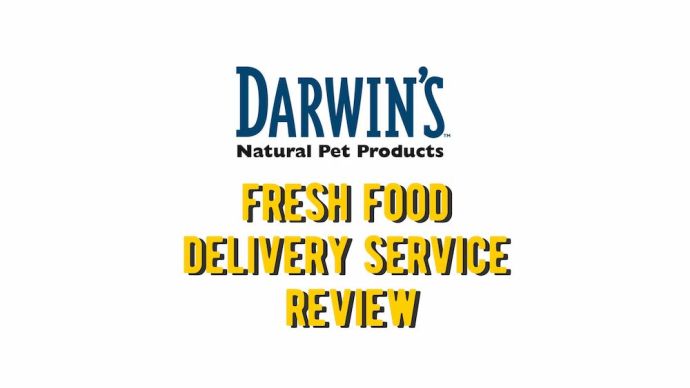 Dog Food Reviews Darwin’s Pet Food Review: Fresh Pet Food Delivery Service Review (Vet Approved)
Dog Food Reviews Darwin’s Pet Food Review: Fresh Pet Food Delivery Service Review (Vet Approved) - 405
- 0
 Dog Products & Toys Reviews The 10 Best Brush for Australian Shepherd: Review and Buying Guide
Dog Products & Toys Reviews The 10 Best Brush for Australian Shepherd: Review and Buying Guide - 13299
- 0









